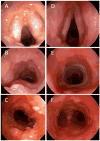Systemic bevacizumab for recurrent respiratory papillomatosis: A national survey
- PMID: 28657692
- PMCID: PMC5607082
- DOI: 10.1002/lary.26662
Systemic bevacizumab for recurrent respiratory papillomatosis: A national survey
Abstract
Objectives/hypothesis: Aggressive laryngeal, tracheal, and pulmonary papilloma is an extremely challenging clinical problem without proven treatment options. A recent German report documented promising results with systemic bevacizumab. The objective of this study is to report the initial experience of this novel treatment in the United States for recurrent respiratory papillomatosis (RRP).
Study design: Cases series.
Methods: Electronic survey of the RRP Task Force of the American Society of Pediatric Otolaryngology, American Broncho-Esophagological Association, and physicians known to the authors to have used systemic bevacizumab for RRP.
Results: Eleven completed surveys were obtained. In three cases, systemic bevacizumab was considered clinically but not administered. Eight patients were treated with systemic bevacizumab, all for aggressive papillomatosis uncontrolled by surgical and adjuvant therapy, including seven of eight with pulmonary disease. Treatment dosing ranged from 5 to 10 mg/kg every 2 to 4 weeks, with all patients responding (7/8 partial response, 1/8 complete response). In four patients who had postbevacizumab chest imaging, three demonstrated improvement of disease and one stabilization. Treatment interval could be lengthened in seven patients and clinical response maintained. One patient with long-standing pulmonary disease (>10 years) was diagnosed with malignant transformation while on treatment, and bevacizumab was discontinued in lieu of other chemotherapeutic agents. All other patients continue on systemic bevacizumab with minimal complications (hemoptysis n = 1, proteinuria n = 1).
Conclusions: Systemic bevacizumab appears to have significant promise in the most treatment-resistant and aggressive forms of papillomatosis with a low complication profile. These results suggest bevacizumab should be studied in a formal clinical trial for RRP.
Level of evidence: 4. Laryngoscope, 127:2225-2229, 2017.
Keywords: Avastin; Recurrent respiratory papillomatosis; bevacizumab; human papillomavirus; laryngeal papilloma; pulmonary papilloma; tracheal papilloma.
© 2017 The American Laryngological, Rhinological and Otological Society, Inc.
Conflict of interest statement
Conflict of Interest: The authors have no financial relationships, or conflicts of interest to disclose.
Figures


References
-
- Healy GB, Gelber RD, Trowbridge AL, Grundfast KM, Ruben RJ, Price KN. Treatment of recurrent respiratory papillomatosis with human leukocyte interferon. Results of a multicenter randomized clinical trial. N Engl J Med. 1988;319(7):401–407. - PubMed
-
- Nagel S, Busch C, Blankenburg T, Schutte W. Treatment of respiratory papillomatosis--a case report on systemic treatment with bevacizumab. Pneumologie. 2009;63(7):387–389. - PubMed
-
- Zur KB, Fox E. Bevacizumab chemotherapy for management of pulmonary and laryngotracheal papillomatosis in a child. Laryngoscope. 2016 - PubMed
-
- Morris KA, Golding JF, Blesing C, et al. Toxicity profile of bevacizumab in the UK Neurofibromatosis type 2 cohort. J Neurooncol. 2017;131(1):117–124. - PubMed
Publication types
MeSH terms
Substances
Supplementary concepts
Grants and funding
LinkOut - more resources
Full Text Sources
Other Literature Sources
Research Materials

